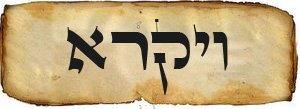|
Vayikra means “He called,” as in the opening verse of our Parsha, “He called to Moshe.” Rashi explains: “Every time G-d communicated with Moshe – whether it was with the expression וידבר (‘He spoke’) or ויאמר (‘He said’), or ויצו (‘He commanded’) – it was always preceded by G-d calling to Moshe by name, for calling (קריאה ) is an expression of affection.” 
In other words, Rashi teaches us here that when G-d called out to Moshe, he was not merely doing so in order to attract Moshe’s attention but, more importantly, it was an “expression of affection.”
And before G-d would speak words of Torah to Moshe, He first expression His affection for him. This teaches us that G-d’s affection for Moshe – and likewise, his affection for every Jew – is more deep-rooted in G-d’s Essence than even the Torah itself.
This however, presents us with a problem when we read the end of our Parsha which speaks about the sin of dishonesty. For if the message of Vayikra is the closeness and affection that G-d feels for every Jew, then why do we find that the Parsha ends with a discussion of sin, something which distances a Jew from G-d?
In truth however, the end of our Parsha speaks not of sin, but of teshuvah (repentance; return). For when a Jew transgresses one of the mitzvos of the Torah, and later decides to return to G-d, we witness the fact that this person has a deep connection to G-d even when his external connection to Torah has been served, and it was that deeper connection which motivated him to return.
So in the final analysis, this is a perfect ending to a Parsha which represents G-d’s unconditional love for a Jew – for it is precisely by virtue of a Jew’s inherent connection to G-d that he is able to return to His Maker even when his relationship via Torah has become temporarily interrupted.
(Based on Likutei Sichos vol.7, p.24-26)
|
